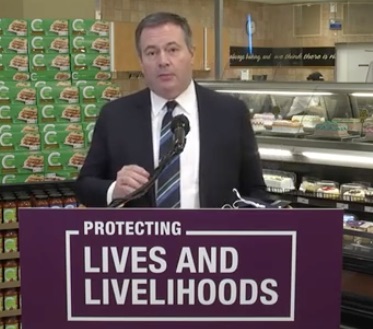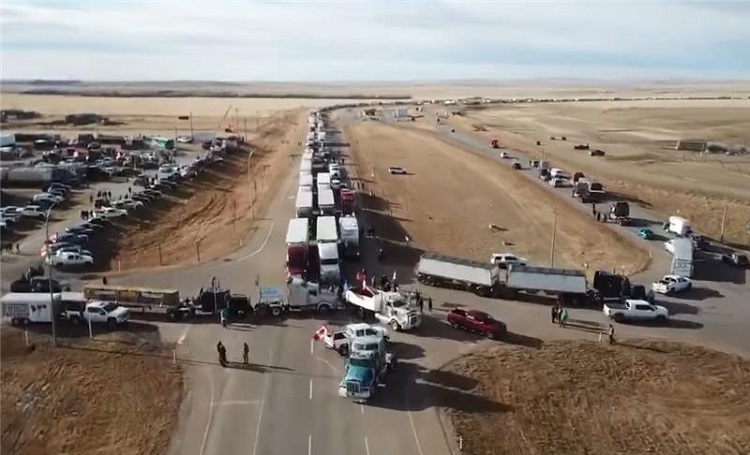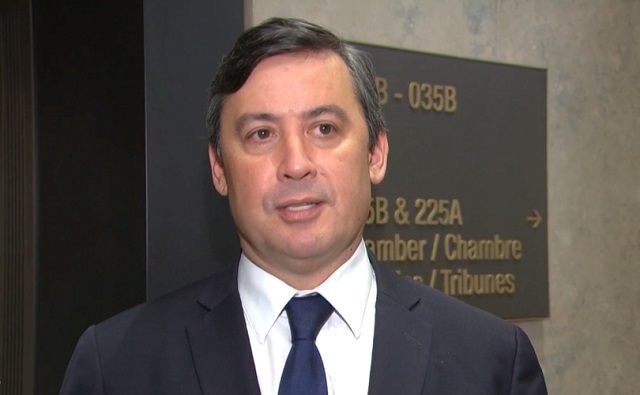Alberta
$1,200.00 boost for “Alberta’s critical workers”

From the Province of Alberta
$465 million for Alberta’s critical workers
Hundreds of thousands of workers who continue to provide critical services to Albertans during the COVID-19 pandemic will receive a one-time payment in recognition of their hard work and sacrifice.
The Critical Worker Benefit is a joint federal-provincial program that will see $465 million go to approximately 380,000 Alberta public and private sector workers as $1,200 cash payments.
“These workers have placed themselves at the front line of this pandemic in order to serve their fellow citizens during a crisis. Alberta’s government is recognizing their good work. We trust this support will help these workers continue to protect lives and livelihoods as we keep fighting this pandemic together.”
The Critical Worker Benefit will be available to workers in the health-care, social services, education and private sectors who deliver critical services to Albertans or support food and medical supply chains.
“I want to thank all the hard-working staff who have gone above and beyond their regular call of duty to support their fellow Albertans throughout this pandemic. This Critical Worker Benefit will go right into the pockets of hard-working Albertans on the front line who have made sacrifices in their own lives for the greater good and well-being of others.”
To be eligible for the benefit, employees must have worked a minimum of 300 hours during the period of Oct. 12, 2020 to Jan. 31, 2021.
“Since the start of this pandemic, we have been deemed an essential service and our store, pharmacy and distribution centre teammates have stepped up to support Albertans and all Canadians. We know that our teammates will be thankful for this recognition and additional support from the Government of Alberta.”
Under the health-care sector, approximately 161,000 eligible employees will receive the Critical Worker Benefit. These eligible occupations include orderlies and patient service associates, respiratory therapists and technologists, nurses (RNs, RPNs, LPNs), food services, housekeeping and maintenance workers and unit clerks.
“I’m proud to see this acknowledgment of our front-line health-care workers. Their continued dedication over the past 11 months caring for patients with COVID-19, but also continuing to provide other important health-care services, has shown tremendous resilience. Their dedication is the strength of our health system and this is just one small way that we can recognize it.”
In the social services sector, approximately 45,000 workers will receive the benefit. Some of the eligible occupations include community disability service workers and practitioners, personal care aides, child development workers, family and youth counsellors, crisis intervention and shelter workers, home support workers, seniors lodge staff, cleaners, food preparation and maintenance workers.
“It has been due to the tremendous efforts of the front-line staff in seniors housing, that our most vulnerable are safe. The precautionary measures workers have taken within their homes and workplaces, where others’ wellness was prioritized over earning potential and personal enjoyments, is why this acknowledgment is so important. This shows appreciation for those our province has had to depend on to keep seniors healthy, happy and safe in licensed supportive living, including lodges, since the onset of the pandemic.”
“Every day, thousands of workers across Alberta support vulnerable people with disabilities and those relying on services provided by shelters. These workers are committed to ensuring people are safe and included in our communities. This benefit acknowledges their extraordinary efforts during the pandemic to provide compassionate and essential care for vulnerable Albertans.”
“Community group care workers and support staff, as well as early childhood educators, have played a critical role in keeping children and youth safe and healthy throughout this pandemic – including staying open or reopening early on to support families. I want to share my sincere gratitude for all their hard work and dedication during these challenging times.”
“Alberta’s seniors lodge workers and unique home operator staff have gone above and beyond to maintain a safe environment for their residents. I am extremely appreciative for the hard work, dedication, and effort of the front-line workers who support seniors and ensure they remain safe during the pandemic.”
Up to 36,000 workers in the education sector will also be eligible to receive the benefit. This includes teacher assistants, bus drivers, custodians and cleaning staff, and administration support.
“Despite the unique challenges that come with learning during a pandemic, students in Alberta continue to receive a world-class education. This is possible thanks to the hard work of thousands of dedicated education workers. This benefit recognizes their determination to go above and beyond for Alberta’s students.”
“Bus drivers across the province have worked tremendously hard to keep students safe while going to and from school. This benefit helps recognize tremendous work done by these essential workers.”
In addition, eligible private sector workers making $25 or less will qualify for the benefit. These workers include: critical retail workers in grocery stores, pharmacies and gas stations; private health provider workers, such as dental assistants, massage therapists and medical administration assistants; food manufacturing and processing workers; truck transportation workers, such as truck drivers and delivery and courier services drivers; and warehouse and storage workers, such as shippers and receivers.
Eligible public sector employees do not need to apply to receive the benefit. Employers will automatically receive the payment through the Government of Alberta to distribute to their eligible employees.
Private sector employers can apply on behalf of eligible employees at alberta.ca/criticalworkerbenefitas of Feb. 17. Employers have until March 19 to apply.
Employers will be responsible for distributing the $1,200 Critical Worker Benefit to their eligible employees.
For detailed information on eligibility and how to apply, please visit alberta.ca/criticalworkerbenefit.
Alberta’s government is responding to the COVID-19 pandemic by protecting lives and livelihoods with precise measures to bend the curve, sustain small businesses and protect Alberta’s health-care system.
Quick facts
- Alberta’s government contributed $118 million toward the $465-million program.
- The breakdown of benefit recipient is:
- Up to $195 million in the health-care sector supporting more than 161,000 workers.
- Up to $55 million toward the social services sector supporting more than 45,000 workers.
- Up to $45 million toward the education sector supporting more than 36,000 workers.
- Up to $170 million toward the private sector supporting more than 140,000 workers.
- Previously allocated:
- $12 million for health-care aides
- $14.4 million for adult congregate care workers
- $3.62 million for children’s congregate care workers
Alberta
Coutts Three verdict: A warning to protestors who act as liaison with police

From the Frontier Centre for Public Policy
By Ray McGinnis
During the trial numbers of RCMP officers conceded that the Coutts Three were helpful in their interactions with the law. As well, there didn’t seem to be any truth to the suggestion that Van Huigenbos, Van Herk and Janzen were leaders of the protest.
Twelve jurors have found the Coutts Three guilty of mischief over $5,000 at a courthouse in Lethbridge, Alberta. Marco Van Huigenbois, Alex Van Herk and George Janzen will appear again in court on July 22 for sentencing.
Van Huigenbois, Van Herk and Janzen were each protesting at the Coutts Blockade in 2022. A blockade of Alberta Highway 4 began on January 29, 2022, blocking traffic, on and off, on Alberta Highway 4 near the Coutts-Sweetgrass Canada-USA border crossing. The protests were in support of the Freedom Convoy protests in Ottawa.
Protests began due to the vaccine mandates for truckers entering Canada, and lockdowns that bankrupted 120,000 small businesses. Government edicts were purportedly for “public health” to stop the spread of the C-19 virus. Yet the CDC’s Dr. Rachel Wallensky admitted on CNN in August 2021 the vaccine did not prevent infection or stop transmission.
By February 2022, a US court forced Pfizer to release its “Cumulative Analysis of Post-Authorization Adverse Event Reports” revealing the company knew by the end of February, 2021, that 1,223 people had a “case outcome” of “fatal” as a result of taking the companies’ vaccine.
On the day of February 14, 2022, the three men spoke to Coutts protesters after a cache of weapons had been displayed by the RCMP. These were in connection with the arrest of the Coutts Four. Van Huigenbos and others persuaded the protesters to leave Coutts, which they did by February 15, 2022.
During the trial numbers of RCMP officers conceded that the Coutts Three were helpful in their interactions with the law. As well, there didn’t seem to be any truth to the suggestion that Van Huigenbos, Van Herk and Janzen were leaders of the protest.
RCMP officer Greg Tulloch testified that there were a number of “factions” within the larger protest group. These factions had strong disagreements about how to proceed with the protest. The Crown contended the Coutts Three were the leaders of the protest.
During his testimony, Tulloch recalled how Van Huigenbos and Janzen assisted him in getting past the “vehicle blockade to enter Coutts at a time during the protest when access to Coutts from the north via the AB-4 highway was blocked.” Tulloch also testified that Janzen and Van Huigenbos helped with handling RCMP negotiations with the protesters. Tulloch gave credit to these two “being able to help move vehicles at times to open lanes on the AB-4 highway to facilitate the flow of traffic in both directions.”
During cross examination by George Janzen’s lawyer, Alan Honner, Tulloch stated that he noticed two of the defendants assisting RCMP with reopening the highway in both directions. Honner said in summary, “[Marco Van Huigenbos and George Janzen] didn’t close the road, they opened it.”
Mark Wielgosz, an RCMP officer for over twenty years, worked as a liaison between law enforcement and protesters at the Coutts blockade. Taking the stand, he concurred that there was sharp disagreement among the Coutts protesters and the path forward with their demonstration. Rebel News video clips “submitted by both the Crown and defence teams captured these disagreements as demonstrators congregated in the Smuggler’s Saloon, a location where many of the protesters met to discuss and debate their demonstration.” Wielgosz made several attempts to name the leaders of the protest in his role as a RCMP liaison with the protesters, but was unsuccessful.”
However, the Crown maintained that the protest unlawfully obstructed people’s access to property on Highway 4.
Canada’s Criminal Code defines mischief as follows in Section 430:
Every one commits mischief who willfully
(a) destroys or damages property;
(b) renders property dangerous, useless, inoperative or ineffective;
(c) obstructs, interrupts or interferes with the lawful use, enjoyment or operation of property; or
(d) obstructs, interrupts or interferes with any person in the lawful use, enjoyment or operation of property.
Robert Kraychik reported that “RCMP Superintendent Gordon Corbett…cried (no comment on the sincerity of this emoting) while testifying about a female RCMP officer that was startled by the movement of a tractor with a large blade during the Coutts blockade/protest.” This was the climax of the trial. A tractor moving some distance away from an officer in rural Alberta, with blades. The shock of it all.
No evidence was presented in the trial that Van Huigenbos, Van Herk and Janzen destroyed or damaged property. Officers testified they couldn’t identify who the protest leaders were. They testified the defendants assisted with opening traffic lanes, and winding down the protest.
By volunteering to liaise with the RCMP, the Crown depicted the Coutts Three as the protest leaders. Who will choose to volunteer at any future peaceful, non-violent, protest to act as a liaison with the policing authorities? Knowing of the verdict handed down on April 16, 2024, in Lethbridge?
Ray McGinnis is a Senior Fellow with the Frontier Centre for Public Policy. His forthcoming book is Unjustified: The Emergencies Act and the Inquiry that Got It Wrong.
Alberta
Maxime Bernier says it’s ‘astounding’ Alberta is ‘pushing’ COVID boosters, tells Danielle Smith to stop it

From LifeSiteNews
The People’s Party of Canada leader tells the Alberta government: ‘It’s over! Get over it!’
People’s Party of Canada (PPC) leader Maxime Bernier said Alberta Premier Danielle Smith should tell provincial health bureaucrats to “back off” and stop “pushing” the mRNA COVID boosters on “anyone,” considering a recent announcement from health officials recommending yet more COVID shots.
“I find it astounding that Alberta public health bureaucrats are still pushing the mRNA boosters on anyone, and especially on children who have never been at risk, almost two years after almost all other pandemic measures have been ended,” Bernier told LifeSiteNews.
“Danielle Smith’s government should tell its bureaucrats to back off and stop stupidly feeding a needless sense of fear surrounding the virus that lingers among certain groups of society. It’s over! Get over it!”
Earlier this week, officials from Alberta Health Services (AHS), whose chief medical officer throughout the COVID crisis, Dr. Deena Hinshaw, was fired by Smith in 2022, updated its COVID booster recommendations to every “three months” starting at babies only six months old.
“Starting April 15, 2024, select groups of Albertans at high risk of severe outcomes from COVID-19 will be eligible for an additional dose,” the AHS noted on its website.
AHS health officials still assert that all “vaccines are safe, effective and save lives,” and that one can get a COVID shot at the same time as a flu vaccine.
On April 16, Bernier commented on the AHS’s new COVID jab guideline changes on X, in which he asked, “What’s going on in Alberta with their “conservative” government?
Bernier, who was a firm opponent of both the COVID shots and mandates, told LifeSiteNews that AHS’s recommendations are puzzling, given “more and more scientific evidence is emerging of dangerous side effects when injecting from these experimental substances.”
“Even though these are only recommendations, and nothing is mandated, this ‘guidance’ by government agencies influences people’s decisions,” Bernier said.
AHS claims that the booster shots “are anticipated to provide a good immune response against currently circulating strains.”
Those under 18 still need written or verbal consent from their parents to get the shot.
AHS is recommending booster jabs for seniors, healthcare workers as well as those with underlying medical conditions. They also recommend that First Nations people and “members of racialized and other equity-denied communities,” as well as pregnant women get the shots as well.
The COVID shots were heavily promoted by the federal government as well as all provincial governments in Canada, with the Alberta government under former Premier Jason Kenney being no exception.
The mRNA shots themselves have been linked to a multitude of negative and often severe side effects in children.
Danielle Smith took over from Kenney as leader of the United Conservative Party (UCP) on October 11, 2022, after winning the leadership. Kenney was ousted due to low approval ratings and for reneging on promises not to lock Alberta down as well as enacting a vaccine passport. Smith was opposed to COVID jab mandates.
Bernier: It’s ‘deplorable’ some provinces still mandate COVID shot for Heathcare workers
While Alberta does not mandate the COVID shots for healthcare workers anymore, British Columbia still does as well as some health regions in Ontario, a fact that Bernier called “deplorable.”
“I find it deplorable that nurses, doctors and other healthcare workers in B.C. and Ontario still have to be vaccinated to work in hospitals and that thousands of them have not been reintegrated,” Bernier told LifeSiteNews.
“The authoritarian covid measures adopted by all governments have been traumatic enough for millions of Canadians. All of them should be lifted.”
Last year, LifeSiteNews reported on how the details of the Canadian federal government’s COVID-19 vaccine contract with Pfizer for millions of doses of the mRNA-based experimental shots were recently disclosed after being hidden for over three years.
The contract with Pfizer shows the government agreed to accept the unknown long-term safety and efficacy of the shots. The details of the Pfizer contract do not disclose how much the government spent on the jabs.
A bill introduced by Conservative Party leader Pierre Poilievre that would have given Canadians back their “bodily autonomy” by banning future jab mandates was voted down last year after Trudeau’s Liberals and other parties rejected it.
Adverse effects from the first round of COVID shots have resulted in a growing number of Canadians filing for financial compensation over injuries from the jabs via the federal Vaccine Injury Program (VISP).
VISP has already paid well over $11 million to those injured by COVID injections.
Earlier this year, LifeSiteNews reported on how officials from Health Canada have admitted that there is “residual plasmid DNA” in the COVID shots after a Conservative MP asked the agency through an official information request if the DNA fragments were in the shots.
As for Bernier, earlier this month he called out Poilievre for dodging a question regarding Canada’s participation in the United Nations’ pro-abortion Paris Climate Agreement.
Throughout most of the COVID crisis, Canadians from coast to coast were faced with COVID mandates, including jab dictates, put in place by both the provincial and federal governments.
After much pushback, thanks to the Freedom Convoy, most provincial mandates were eliminated by the summer of 2022.
There are currently multiple ongoing class-action lawsuits filed by Canadians adversely affected by COVID mandates.
-

 COVID-1919 hours ago
COVID-1919 hours agoCDC Quietly Admits to Covid Policy Failures
-

 Brownstone Institute10 hours ago
Brownstone Institute10 hours agoDeborah Birx Gets Her Close-Up
-

 COVID-1922 hours ago
COVID-1922 hours agoJapanese study shows disturbing increase in cancer related deaths during the Covid pandemic
-

 espionage2 hours ago
espionage2 hours agoConservative MP testifies that foreign agents could effectively elect Canada’s prime minister, premiers
-

 Great Reset17 hours ago
Great Reset17 hours agoClimate expert warns against extreme ‘weather porn’ from alarmists pushing ‘draconian’ policies
-

 Health1 hour ago
Health1 hour agoQuadriplegic man dies via euthanasia after developing bed sores waiting at Quebec hospital
-

 Economy2 days ago
Economy2 days agoExtreme Weather and Climate Change
-

 Bruce Dowbiggin2 days ago
Bruce Dowbiggin2 days agoWhy Are Canadian Mayors So Far Left And Out Of Touch?


